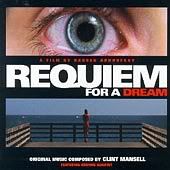Movie Review: Requiem For A Dream
For any piece of writing to be effective it necessarily has to keep the reader intrigued. Writers of non-fiction will inevitably stray towards sensationalism and exaggeration so as to make the piece interesting enough to be read to its conclusion. Things are simplified and packaged into a nice theme that fits into the one thousand word format.
The temptation and thrill at being able to create worlds and having others take their renditions as accurate has driven many writers to blur the line between fact and fiction. There are other reasons as well; to ease the pressure of deadlines, avoid annoying things like research and other types of legwork and increase the writer's personal success. The parsing of reality into the most objective and truest representation possible is usually not the one that will result in the most entertaining read though typical praise would lead a person to believe otherwise.
Take war as a subject, for example. Anyone convinced of the authentic nature of a piece about the horrors of war is in reality congratulating the writer on his skill in constructing an entertaining narrative. That the reader has been affected by the writing, focussed more on a particular issue and come away reeling at the inhumanity of it all is probably a good thing. Had fiction-like tools not been used to strengthen the narrative and ratchet up tension, the reader may not have felt compelled enough to continue reading to the end.
It's not that elements of fictionalized stories don’t exist in the real world. It's not that most people when queried wouldn't accept that any particular example of non-fiction necessarily reflects the writer's own bias and a desire to be heard. Most would admit to a healthy skepticism regarding anything they read but at the same time we like to be taken along for an entertaining ride. If we gain something that we think instructs us on life and provides a one-up on others, then all the better.
Loathe to admit that they're the ones providing all the angles in an attempt to give more credence to whatever unique slant they're attempting, writers will introduce composite "friends," unnamed sources and supposed insiders. All of whom take the place of real characters. Sure, many of these are real people providing authentic insight and supporting a thesis, but liberties are often taken in this regard.
Like war, stories about the dangers of drugs almost inevitably end up romanticizing the ordeal. Newspapers and magazines are replete with suburban redemption tales with the survivor highlighted as someone who has truly accomplished something. There seems to be therapeutic value or just the plain thrill of having your own life romanticized by a skilled writer that seems to move people to want themselves featured in such a piece (often referred to as a tot piece--triumph over tragedy.) What steps do people like this actually take to alert the media that they've ridden out the requisite personal horror and are now ready for the final step towards recovery, to have their personal lives smeared all over some rag in a sensationalistic piece?
Do they simply place a call to the paper's switchboard and are then transferred to the writers on staff known for spinning such tales? Perhaps there's a name bank with various categories, rape, drug addiction etc., and when a particular tragedy becomes the flavour of the day, one of the fools is contacted.
Just as a chronic lender of money is the one least likely to pay it back, so the individual with the compulsion to see the intimate details of their life aired in public may provide skewed insight. Perhaps they've studied such accounts and tailored their own story to follow a similar formula. They might recognize that the facts or solid logic expressed usually don't resonate as much as a particular imagery, a particular stylistic pattern that is more easily consumed by the masses.
If these are problems inherent in non-fiction, then the much more prevalent examples of fiction storytelling must surely be free from such obstacles.
However, while those obstacles may not be there, the end result might be similar. It is just that prevalence that makes all forms of fiction--and most prominently, film and television—-the single source for providing insight into moral dilemmas for many people in society. While ostensibly the same level of diligence doesn't apply as it is "only entertainment," audiences may in many cases attach as much significance to works of fiction.
You would receive a head-shaking, breath-exhaling, monumental scoff from most if you suggested they have their world view shaped by cinematic renderings. Yet those same people are likely willing to give their validation to certain, well-done pieces; "a realistic war movie," "a shocking look at the effects of drug abuse." That they themselves have never experienced such things and have no true barometer of authenticity is only proof that their seal of approval is simply a nod towards the director's ability to produce what they conceive as a convincing piece.
Or maybe that's elevating some experiences to such a plane that even undergoing such an ordeal yourself would leave you wondering if it was authentic...
All of these considerations are part of that age-old question; "Does art imitate life or does life imitate art?" and were part of my thoughts after having watched
Requiem for a Dream.This film slipped under my radar back in 2000 when it was released but in recent years I have heard plenty of feedback, the kind of buzz reserved for those gut-punch movies that leave you reeling and are usually proclaimed authentic for that reason alone.
It's a film based on the book by the late
Hubert Selby Jr., a yank writer who was influenced heavily by the so-called beat writers of the 50's and 60's. Take the
Kerouac stream of consciousness style and fuse it with some of
Ginsberg's matter-of-fact/celebratory musings on the junky scene and you have some idea of Selby's style. Filmed a few years before his death, Selby even has a brief cameo appearance in the movie. Selby was known for looking at the dark side of life and exploring human pain to its fullest. This film follows that tradition and is based in a fitting locale.
Anyone not familiar with the US through travel or time spent living there has still developed a hazy mental image and feel (however inaccurate it may be) for various locales in that country due to a lifetime of watching Hollywood movies. Coney Island is a place that always evokes a strange mix of dreary imagery; lost hope, yearning, a not unappealing setting (the water and Manhattan skyscrapers in the distance) scarred with the ever-present dilapidated amusement park rides and boardwalk.
The kind of place where blue-collar workers end up—the ones who can't afford the more expensive neighbourhoods of New York city. Add in retirees who lived modest middle-class lives and the usual collection of directionless youngsters in every bleak, dead-end town who can never quite get it together to get move on to bigger and better things once they have grown, and you have the Coney Island of my mind's eye.
This then is the setting for the film, one that charts the course of 4 lives and the impact of drug addiction upon them. Pain is sublime, pure and all encompassing in this ordeal of a movie, where there is never any doubt regarding who will win—the narcotics (actually heroin in 3 cases and a nasty diet pill addiction in the other) or the characters involved. The only matters in question are how sweetly wrenching their downfalls will be, what horrific fate awaits each and whether any sense of hope at all can be snatched from the depths of despair.
In essence this film is comprised of 4 character sketches in self-destruction as induced by dependence on drugs. None of the minor obstacles thrown in the way of the characters are overcome so much as embraced. There are some not unexpected twists to the semblance of a plot but again, the downward trajectory is never really halted or in question.
The story centers around Harry Goldfarb (played by
Jared Leto), his girlfriend Marion (
Jennifer Connelly), their friend Tyrone (
Marlon Wayans) and Harry’s mother, Sara (
Ellen Burstyn).
The 3 youngsters descend into their heroin hell with a brief respite as a half-cocked plan to get some money from dealing so as to fulfill their dream the title refers to, disintegrates and their slow-motion suicides are back on track.
The plight of Sara Goldfarb is slightly different from the others though no less painful to watch. A widow who lives in a dingy flat and spends her time watching surreal daytime game-shows, she receives a call from a telemarketer convincing her that she too can appear on television. This quickly becomes her entire reason for living, her dream, and in preparation for some anticipated future TV debut, she finds a doctor who prescribes a teeth-gnashing, manic cycle of amphetamines to help her lose weight. Ellen Burstyn does a good job in her role and will evoke a great deal of sympathy and empathy from most viewers.
The scenes cutting to and from the game-show she watches together with the drug-induced illusions in her flat become a bit monotonous at times though overall the effect is quite good.
In fact, there are good performances all around in this film. All the actors squeeze some undiluted pain into their deliveries, including some scenes that must have been just as difficult to pull off as they are to watch. However, in a film that, as mentioned, is character driven, with the exception of the aging and pitiful Sara, there isn't much insight into what brought these individuals to this point in time and what makes them such vulnerable specimens, ripe for the corrosive effects of addiction. They each get at least one chance to pour out their souls to each other in the calm before the storm, as they stroke themselves into pain-numbing bliss with each subsequent hit, but where did this capacity for weakness and self-destruction come from? Maybe it's in all of us to varying degrees and the most sensitive and naive will succumb to the evils of drug use more easily if we choose to take that route.
Jenniffer Connelly’s was another performance of the 4 that struck me. She has established herself as an actress skilled in capturing the emotional pain of a character and distilling it into some riveting performances (for another similarly impressive role, see her in
The House of Sand and Fog.)
The theme that runs through this is simple and stark: DRUGS ARE BAD. No matter what your intentions, once you choose that path you're fucked. It doesn't come off in a condescending or lecturing way in the least...here are 4 people and what happened to them, take it as you will. Of course people like this who fall prey to the insidious side of drugs do exist and are easy to find, just as are the recreational, functional user type.
The results as detailed here play into the well established pop-culture story-line of heroin as the nastiest of the nasty and can't help but romanticize the lives of the characters to some degree no matter how gritty and merciless their ends are. It's the slow-motion suicide, do something up right even if it's self-destruction, no subtleties to be had motif that I'm guessing has resonated so well with the MTV generation. As a result this film has almost reached that cult-like status, on the must-watch list of everyone who knows they're hip to the hardcore realities of the world.
Director
Darren Aronofsky does a good job here with gloomy atmospheric scenes with plenty of close-ups of tortured faces and some unorthodox (though such methods are becoming so common as to be less and less experimental) uses of the camera to capture various emotions and moods. The climax is the culmination of a relentless march towards total misery and leaves the viewer hammered senseless with nary a shred of hope.
There is not much in the way of feel-good emotions to be gained by the viewer here, except to marvel at the depths of others' despair, feel the weight of empathy and be thankful for your own trivial problems in life.
Now! Where can I score some of that insanely powerful junk so as to induce a wrenching downward slide into hell that will result in my being eulogized by jaded hipsters for generations to come?
Cross-posted at: Blogcritics




